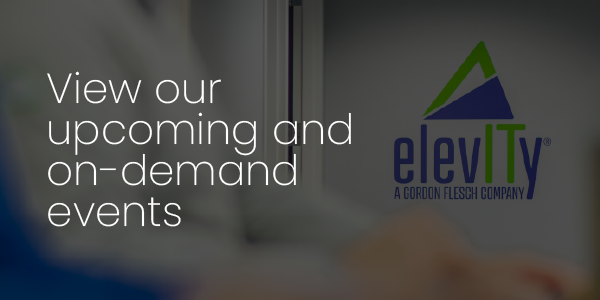Preparing for a cyber insurance audit can feel overwhelming, but it doesn’t have to be. Auditors want to see clear evidence that your organization takes cybersecurity seriously and has safeguards in place to reduce risk.
To help you get ready, we’ve compiled a checklist of the most common requirements insurers look for during an audit. Use this as a guide to ensure your business is well-prepared and positioned for cyber insurance coverage.
- Security Policies & Procedures
- Access Controls
- Data Protection
- Network Security
- Employee Security Training
- Vendor & Third-Party Risk
- Compliance & Documentation
- Incident History Records
ARTICLE: Cyber Insurance 101 - What You Need to Know to Protect Your Business
Ready to dive in? Let’s start with the first area auditors care about most—your security policies and procedures. Here’s what you need to know.
Security Policies & Procedures
Cyber insurance auditors want proof that your organization takes security seriously—and that starts with documented cybersecurity policies. They’ll also check for an incident response plan that outlines how you’ll react if something goes wrong. These aren’t just boxes to tick; they show you’re prepared to minimize risk and recover quickly.
If this sounds overwhelming, don’t worry. Elevity walks clients through every step, making sure policies are clear, plans are actionable, and the whole process feels less like a high-stakes exam and more like a guided tour toward better protection.
Access Controls
Strong access controls are a must for any business looking to reduce risk. That starts with multi-factor authentication (MFA) on all critical systems. MFA adds an extra layer of security beyond passwords, making it much harder for attackers to break in.
You’ll also need role-based access, meaning employees only have the permissions they need and least privilege enforcement to keep exposure low. These steps can feel technical, but they’re essential for protecting sensitive data.
Elevity helps clients implement MFA, fine-tune access policies and keep everything aligned with best practices—so you can check this box with confidence and keep your business secure.
Data Protection
Keeping your data safe isn’t just smart—it’s a requirement for cyber insurance coverage. Auditors look for encryption on sensitive information, both when it’s stored and when it’s moving across networks. They also want to see a solid backup strategy that includes offsite or cloud redundancy, so your business can bounce back quickly if disaster strikes.
These steps protect your data and your reputation. However, setting them up can feel complex. Elevity makes it simple by helping clients create secure backup plans, implement encryption and follow best practices—so you’re covered from every angle.
Network Security
Your network is the front door to your business—and it needs a solid lock. Cyber insurance reviews often focus on firewalls to block unwanted traffic, SIEM solutions to monitor and alert on suspicious activity and regular vulnerability scans to catch weaknesses before attackers do. Patch management is another biggie—keeping systems updated closes the gaps hackers love to exploit.
This all sounds like a lot, but Elevity makes it manageable. We help clients deploy advanced firewalls, implement SIEM solutions for real-time visibility and stay on top of scanning and patching protocols—so your network stays strong and your audit goes smoothly.
Employee Security Training
Even the best tech can’t stop a click-happy employee from falling for a phishing scam. That’s why cyber insurance reviews often include proof of ongoing cybersecurity awareness training. Auditors want to see that your team knows how to spot suspicious emails, handle sensitive data, and respond to threats. Regular training—plus phishing simulations—keeps security top of mind and reduces risk across the board.
Elevity makes this easy with engaging, easy-to-understand programs that fit your business. We help you schedule training, track progress and keep everyone sharp—because your people are your first line of defense.
Vendor & Third-Party Risk
Your security is only as strong as your weakest link—and sometimes that link is a vendor. Cyber insurance reviews often check whether you have contracts with clear security requirements and a process for assessing third-party risk. This means verifying that partners follow best practices and don’t introduce vulnerabilities into your environment.
Elevity helps clients build vendor risk programs, review agreements and implement tools to monitor compliance—so you can keep your supply chain secure and your audit stress-free.
Compliance & Documentation
Cyber insurance providers want proof—not just promises. That means keeping detailed logs of security events, audit trails and evidence that you follow industry standards like NIST or ISO. Documentation shows you’re not only talking the talk but walking the walk when it comes to cybersecurity.
Elevity helps clients organize and maintain the right records without the stress. From compliance checklists to automated reporting tools, we make sure you have everything in place to satisfy auditors and strengthen your overall security posture.
Incident History Records
In addition to the above, cyber insurance providers will look for records of breaches, the steps you took to contain and remediate them, and—most importantly—what you learned from the experience. Showing that you’ve documented incidents and improved your defenses demonstrates accountability and resilience.
Gathering this information can feel like digging through old files, but Elevity makes it easier. We help clients organize incident reports, identify gaps and turn lessons learned into actionable improvements—so your history works in your favor instead of against you.
Cyber insurance audits don’t have to feel like a pop quiz. With the right policies, controls and training in place, you’ll not only pass the audit—you’ll strengthen your overall security posture. And you don’t have to tackle it alone. Elevity is here to guide you every step of the way, making sure your business is prepared and protected.
Ready to see where you stand? Start with our free IT Checklist for Businesses and take the first step toward peace of mind.
















